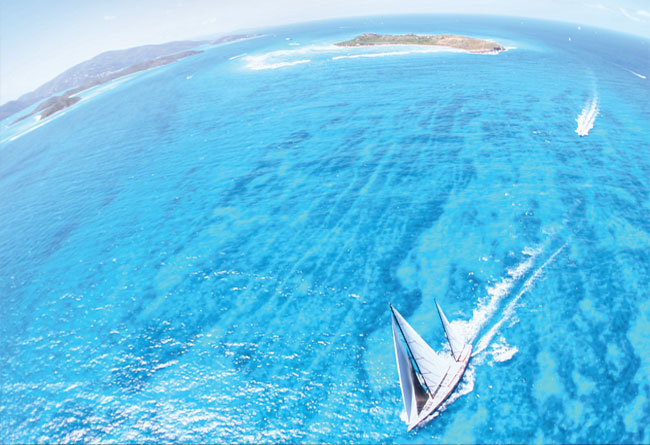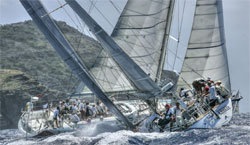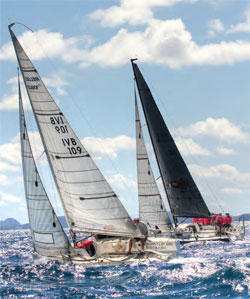

After the hurricanes few thought that organisers would even run most of their 2018 regattas, let alone so successfully. Sailors and locals worked together to rebuild, because when you love something, you fight for it
I n late 2017 hearts sank for millions of people who know and love sail racing in the Caribbean as they watched the desperate news roll in hour after hour. Three major hurricanes tore an ugly path of destruction through the Leeward Islands during September and October. Two of them, Hurricanes Irma and Maria, both reached the highest measurable wind rates, revolving up to a level of Category 5 in strength. Those who observed the satellite meteorology were shocked to see the deeply-distressing images of three major hurricanes progressing in a merciless line through the Atlantic, Caribbean and Gulf of Mexico. The sight of the tiny islands of Barbuda and St Barts, clearly identifiable and visible in the eye of these monstrous systems, was genuinely heartbreaking.
Considering how much catastrophic damage and devastation was caused to the civil and marine infrastructure in some areas, and considering how this destruction occurred only a matter of weeks before the opening of the Caribbean sailing season, one was left in little doubt that the CSA (Caribbean Sailing Association) regatta year would be somewhat different in 2018, to say the least. How could the various regatta organisers even hope to arrange racing in the face of such overwhelming logistical challenges?
The season was different and in a number of ways. Some events were indeed cancelled and there can be no doubt that a number of vessels chose to follow a different agenda during the 2018 season, excluding their usual Caribbean participation.
However given the monumental odds against, few would have believed early in 2018 that there would be a such a supreme effort made to rebuild the infrastructure so quickly in the many islands affected. With notable exceptions (eg the RORC Caribbean 600), the numbers of entrants were down in many regattas as expected – and the massive devastation across the British and US Virgin Islands meant that being ready in time was an impossible task for the organisers of sailing events around those islands, forcing some of them to cancel. But, astoundingly, the majority of the events did go ahead as planned.
The early Caribbean regattas all took place in the unaffected islands of Barbados, Grenada and Antigua as usual. In Barbados the newlyformatted Barbados Sailing Week delivered an excellent mix of coastal races including the Mount Gay Round Barbados Race, from which the series originated, and the Ocean Passage to Antigua, back in time for the Super Yacht Challenge. This was quickly followed by Grenada Sailing Week, allowing for the vaguely northerly sail for the many race charter and Caribbean boats that form the heart of this regatta. The fleet is a tight 50 boats, which means the event retains a warm, friendly sailor-centric spirit and a wonderfully authentic old-time West Indian feeling to the occasion.
Forty years ago there were probably only three regattas in the Caribbean that one could seriously consider of note in an international sense. Participating numbers were as low as 30 entrants. Thirty years ago there were only seven events and 20 years ago probably only nine or 10 that would qualify as international in stature, but with participating entrants as high as 250 boats. Today with 13 recognised events and a wide cross section of international offerings including two world class offshore races, there has never been more choice or diversity for those who love racing among these islands. The CSA can take enormous credit for being an organisation that is associated with an international and unified programme that is quite simply unmatched anywhere else in the world.
Antigua Sailing Week is now more than half a century old and many will still recall the schooner races up and down the islands. But Antigua Sailing Week remains the founding father of the Caribbean regattas – and the elements of that are what we still see today in most if not all of the Caribbean programmes. A competitive edge out on the course, but always plenty of fun in the sun when the racing’s done. Over the years, new events have grown (and then shrunk) and other new events have been established, some of which have then either gradually disappeared, completely changed in structure or moved to another venue such as the first Nautor’s Swan event originally held in Antigua in early 1980s – now sailed in the BVI.
As history progressed the appetite for certain types of regattas in the Caribbean struck a chord. At one particular time, bareboat charter with destination racing proved very popular. Many Caribbean competitors in the 1980s and 1990s would expect to be staying on the vessel they were racing. Then, as the types of yachts participating changed, many of the boats either had less room for the crew or were less comfortable to stay on, actively discouraging onboard accommodation. Aspirations became higher and some people participating now found the idea of a comfortable hotel or villa hugely attractive, and those options were becoming readily available ashore. So destination racing became less popular for teams who then had to travel by taxi to and from the boat, which could be in a different area each day. Organisers had to address this and today, for example, the fleet at Antigua Sailing Week now returns to the same venue after every race – a big change from earlier years. However, there are still two destination parties, a layday and a party at the end of the regatta that are not part of the racing programme. So boats can cruise to and moor at those events if they so choose – it’s proved to be a very successful format.

The Farr 65 Spirit of Isis crosses ahead of the Swan 51 Northern Child at the start of the day’s racing during Antigua Sailing Week. Chartering means that many more sailors can get the chance to experience racing in the Caribbean (once you’re hooked, it seems pretty certain that you’re really hooked...)
Herein lies a significant equation that has to be addressed by all Caribbean regatta organisers. How do they adapt to the changing needs of the regatta format? How do they accommodate any new aspirations, including those of owners who now bring vessels with professional crews, while still satisfying participants of long standing who are perfectly happy with the existing formats? After various changes and some undeniably lean years, the race committee and the organisers at the 2018 Antigua Sailing Week have shown a beacon of light in the way a regatta should be run in the Caribbean – and they proved the CSA rule to be a singularly-useful tool in their endeavour.
In 2018 the variety of vessels participating at Antigua Sailing Week was as broad and diverse as it could possibly be in any regatta of some 120 boats. Many of the class splits between boats in the two divisions were hard choices but the organisers manged to satisfy most competitors – addressing many requests and making class and rating changes almost up to the last minute before the start of racing. As an example of their success, in one class there was a 40-year-old Bruce Farr IOR design battling for line and handicap honours against a two-year-old JPK 1080 and a new Sunfast 3600. Many of their races were won or lost by seconds, creating rare fun for the participants. The courses were all good choices and on one day the experienced committee made an excellent decision to hold the fleet in port until some inclement weather had passed through. How refreshing when compared with some past experiences!
It’s an old adage that you cannot please all of the people all of the time but Antigua Sailing Week this year captured a rare atmosphere of success in every department – not only in the racing organisation but in the onshore activity and entertainment as well. In its cyclical history, Antigua Sailing Week is re-discovering its legendary magic and anyone who has not participated recently should return in 2019 to see this for themselves.
The St Barth's Bucket is a grand event with the grandest of yachts. The history of Bucket racing has an aura of sailing folklore (much of it true!) that has been enhanced by the eye-popping size of the modern superyachts now participating as well as the re-introduction of the high-tech J-Class yachts recently being built or renovated. First there was Endeavour, followed by Velsheda – who would have believed that nine or more of these spctacular yachts are now racing regularly? The Bucket is an event that has grown exponentially in both the number and the size of the yachts taking part. However, the 2018 edition was in grave danger of being boycotted by owners and captains who were understandably nervous and concerned about the hurricane damage to the island infrastructure. How wrong and unfounded this turned out to be. This year there were 26 yachts participating – in the past there have been up to 40 in the fleet. The smaller number of yachts in the 2018 edition actually made the regatta a much more enjoyable event for several reasons. Not least because the island has a small infrastructure and all the restaurant bookings and parking availability (even scooter rental) were far easier due to the reduced demand. While it’s understandable that more participants make a regatta more commercially viable, from a competitor point of view it seems big is not always beautiful. However, competitors and participants supporting this wonderful regatta in 2019 will bring invaluable contributions to the local economy as the island continues its recovery.

A J/70 gently (this is the Caribbean) rolls over a Melges 24 at the BVI Spring Series. The sheer pleasure of sailing yachts in this region ensures that anyone who has raced here is likely to make every effort to return. It is one of life’s singular pleasures and it does all sorts of good for local economies which need a boost right now... and will continue to do so for several more winters yet
Les Voiles de St Barth is an excellent regatta and will celebrate its tenth anniversary in 2019. Although 2018 was slightly down in the anticipated numbers attending, it highlighted again that smaller events that are well run do have a great deal to offer aspiring sailors as well as any professionals. Following some lightwind affairs in recent years, what was so different about the 2018 edition of Les Voiles was the elevated breeze during the races. On the last day’s racing, the many yachts that did not use spinnakers on the downwind legs fared better than those that did. Sailing conditions in the Caribbean do vary enormously each year.
In 2019 there are 13 main sailing events offered on the CSA international regatta calendar. Many of them include a ‘round the island’ race within the event and a few offer an optional day of racing generally at the beginning of the regatta and scored separately, and this group alone has attracted some attempts at record breaking. They include Barbados, Antigua (two separate events), St Maarten, Round the Rocks in St Thomas, St Barths and Tortola. There are also many other local regattas and sailing events that take place throughout the Caribbean that use the CSA ratings as well, particularly in the French Islands.
The final race on the international calendar is the Antigua-Bermuda Race. This offshore sprint is one of the Caribbean’s newest events, the successful second running of which took place in 2018.
Anyone lucky enough to be going to the Caribbean in 2019 for the CSA racing should support, if they can, the events in St Maarten, the USVI and the BVI regions, where the islands are still in recovery. St Maarten Heineken Regatta has recently announced that the race format will change from an optional one day plus three race days to a four-day regatta. This should prove very successful and make the regatta even more attractive, post-RORC Caribbean 600. The 2018 Caribbean season was a revelation of change and diversity and anyone who makes the effort to go in 2019 will discover the same satisfaction. For many years the CSA has been supporting such aims and the association is the backbone of a wide experience that is challenging, different each year and, happily, available to all.
The full Caribbean racing calendar including local and regional events can be found at www.caribbean-sailing.com.
 |
 |
 |
 |
 |
 |
 |
 |
 |
 |
 |
 |
We invite you to read on and find out for yourself why Seahorse is the most highly-rated source in the world for anyone who is serious about their racing.
To read on simply SIGN up NOW
Take advantage of our very best subscription offer or order a single copy of this issue of Seahorse.
Online at:
www.seahorse.co.uk/shop and use the code TECH20
Or for iPad simply download the Seahorse App at the iTunes store


